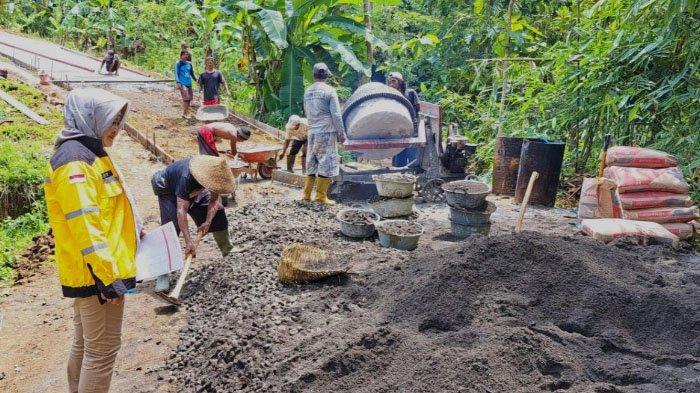President Prabowo Prioritizes Village Development to Accelerate Economic Equality

By: Hasbullah Alatas *)
President Prabowo Subianto has made village development a top priority in his government’s program, with the hope of accelerating economic equality to remote areas of the country. To support this goal, President Prabowo changed the structure of the Ministry of Villages, Development of Disadvantaged Regions, and Transmigration (PDTT) into two separate ministries. First, the Ministry of Villages and Development of Disadvantaged Regions, which is now led by Yandri Susanto as minister, with Ahmad Riza Patria as his deputy. Second, the Ministry of Transmigration, which is specifically tasked with handling transmigration. This decision shows President Prabowo’s commitment to advancing villages as the main pillar of national economic progress.
The initial step taken by the Ministry of Villages and Development of Disadvantaged Regions is to maximize the use of village funds, which this year reached IDR 71 trillion. Yandri Susanto, the minister directly responsible for this program, emphasized that village funds must be managed effectively to create independent and prosperous villages. According to him, continuous coaching and training must be carried out so that the funds are right on target and can have a positive impact on village welfare. This is important because each village has different conditions and needs, so the approach used must be in accordance with the characteristics of each village.
President Prabowo also provided clear direction in addressing food security, one of the most pressing aspects for rural areas in Indonesia. In this context, he emphasized that villages must be the main driving force in meeting food needs independently. Based on Yandri Susanto’s explanation, around 20 percent of village funds will be allocated for food security programs that aim to ensure that every village has sufficient access to basic food. In areas such as East Nusa Tenggara and Papua, people often have difficulty obtaining food. Therefore, by developing food security from the village, it is hoped that every region in Indonesia can meet its own food needs, support the welfare of local communities, and reduce dependence on supplies from outside the region.
In addition to food security, the government is also focusing on energy self-sufficiency. President Prabowo emphasized the importance of reducing dependence on fossil fuels through the development of renewable energy. Indonesia has great potential in renewable energy spread across various regions. By utilizing this potential, villages in Indonesia are expected to be able to meet their own energy needs. According to Yandri, energy self-sufficiency is not only a solution to overcome the uncertainty of energy supply due to geopolitical dynamics, but also a strategic step in increasing village independence. This program is in line with the government’s vision to create an energy-independent and sustainable Indonesia in the future.
The government also prioritizes improving the quality of human resources (HR) in villages. One of the planned methods is to make villages providers of raw materials for the free nutritious meal program (MBG) designed to overcome stunting. By involving villages in the provision of raw materials, it is hoped that the village economy can grow along with increasing community welfare. This step shows the government’s concern for meeting the nutritional needs of village communities and efforts to improve the quality of life of the next generation. President Prabowo understands that investing in human resources from an early age is very important, especially for village communities who often have limited access to education and health resources.
Under President Prabowo’s leadership, these programs are expected to bring about significant changes in economic equality. Focusing on villages as centers of development will not only boost the rural economy, but also has the potential to reduce excessive urbanization. As villages develop into independent economic centers, villagers no longer feel the need to migrate to the city to find work. In addition, with food security, energy self-sufficiency, and human resource development, villages are expected to become examples of sustainability for a stronger and more resilient national economy.
The government, through the Ministry of Villages and Development of Disadvantaged Regions, continues to monitor the implementation of these programs in the hope of achieving optimal results. The full support of President Prabowo reflects the government’s commitment to ensuring that village development is not just a discourse, but is truly realized as part of a grand strategy to build Indonesia from the periphery. With solid cooperation between the central government, regions, and the village community itself, it is hoped that villages throughout Indonesia can feel the direct impact of the government’s efforts to create fair and equitable economic equality for all Indonesian people.
President Prabowo’s comprehensive approach to village development shows that this government has a far-sighted vision. The grand vision that prioritizes village welfare as one of the important foundations towards Golden Indonesia 2045 provides new hope for the future of this country. With a strong policy direction and supported by measurable implementation, villages in Indonesia will no longer be considered lagging behind, but will emerge as an economic force to be reckoned with. The government is optimistic that this step will not only support the acceleration of village development, but also strengthen the national economy as a whole, making villages a solid foundation for a more advanced and prosperous Indonesia.
*) Economist/Researcher from the Pancasila Madani Institute
